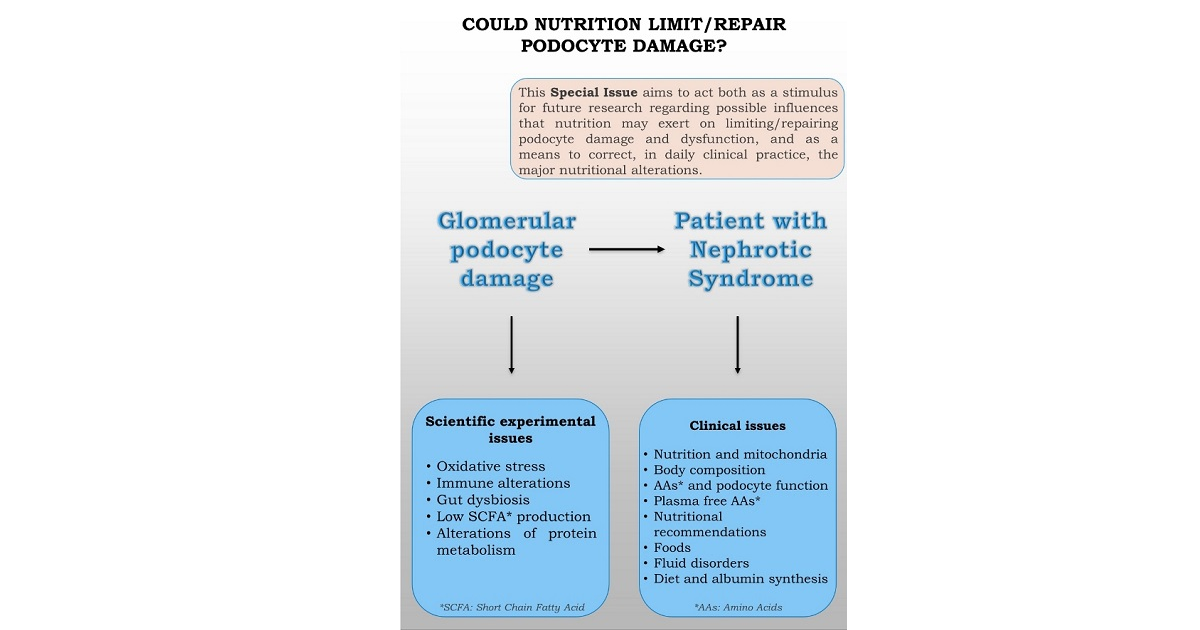- 5.0Impact Factor
- 9.1CiteScore
- 16 daysTime to First Decision
Nutritional Problems from Nephrotic Syndrome
This special issue belongs to the section “Clinical Nutrition“.
Special Issue Information
Dear Colleagues,
Nephrotic Syndrome (NS) poses a number of nutritional and metabolic problems due to glomerulus injured podocytes, which are responsible for the loss of barrier function, causing proteinuria, altered fluid and electrolyte balances, and hypoalbuminemia. In addition, patients may present with macro-micronutrient deficits, hyperlipidemia, growth retardation (in pediatric patients), and malnutrition.
This Special Issue aims to act both as a stimulus for future research regarding possible influences that nutrition may exert on limiting/repairing podocyte damage and dysfunction, and as a means to correct, in daily clinical practice, the major nutritional alterations.
Relative to nutrition influence on podocyte metabolism, for example, how can we reconcile the need for increasing protein intake to improve serum protein status with the fact that amino acid (AA) starvation promotes podocyte autophagy, important for maintaining podocyte homeostasis?
Is there a need to correct patient AA intake given that, for example, elevated homocysteine damages the glomerular structure, whereas glutamine, by alkalinization of podocytes, reduces proteinuria?
In relation to daily clinical practice, may supplementation with essential amino acids improve the syntheses of serum proteins, including albumin, transferrin, erythropoietin, and hemoglobin, limiting in this way their urinary losses?
Prof. Dr. Roberto Aquilani
Dr. Manuela Verri
Guest Editors
Manuscript Submission Information
Manuscripts should be submitted online at www.mdpi.com by registering and logging in to this website. Once you are registered, click here to go to the submission form. Manuscripts can be submitted until the deadline. All submissions that pass pre-check are peer-reviewed. Accepted papers will be published continuously in the journal (as soon as accepted) and will be listed together on the special issue website. Research articles, review articles as well as short communications are invited. For planned papers, a title and short abstract (about 250 words) can be sent to the Editorial Office for assessment.
Submitted manuscripts should not have been published previously, nor be under consideration for publication elsewhere (except conference proceedings papers). All manuscripts are thoroughly refereed through a single-blind peer-review process. A guide for authors and other relevant information for submission of manuscripts is available on the Instructions for Authors page. Nutrients is an international peer-reviewed open access semimonthly journal published by MDPI.
Please visit the Instructions for Authors page before submitting a manuscript. The Article Processing Charge (APC) for publication in this open access journal is 2900 CHF (Swiss Francs). Submitted papers should be well formatted and use good English. Authors may use MDPI's English editing service prior to publication or during author revisions.
Keywords
- nephrotic syndrome
- nutrition
- injured podocyte repair
- protein supplementation
- amino acid supplementation

Benefits of Publishing in a Special Issue
- Ease of navigation: Grouping papers by topic helps scholars navigate broad scope journals more efficiently.
- Greater discoverability: Special Issues support the reach and impact of scientific research. Articles in Special Issues are more discoverable and cited more frequently.
- Expansion of research network: Special Issues facilitate connections among authors, fostering scientific collaborations.
- External promotion: Articles in Special Issues are often promoted through the journal's social media, increasing their visibility.
- Reprint: MDPI Books provides the opportunity to republish successful Special Issues in book format, both online and in print.


